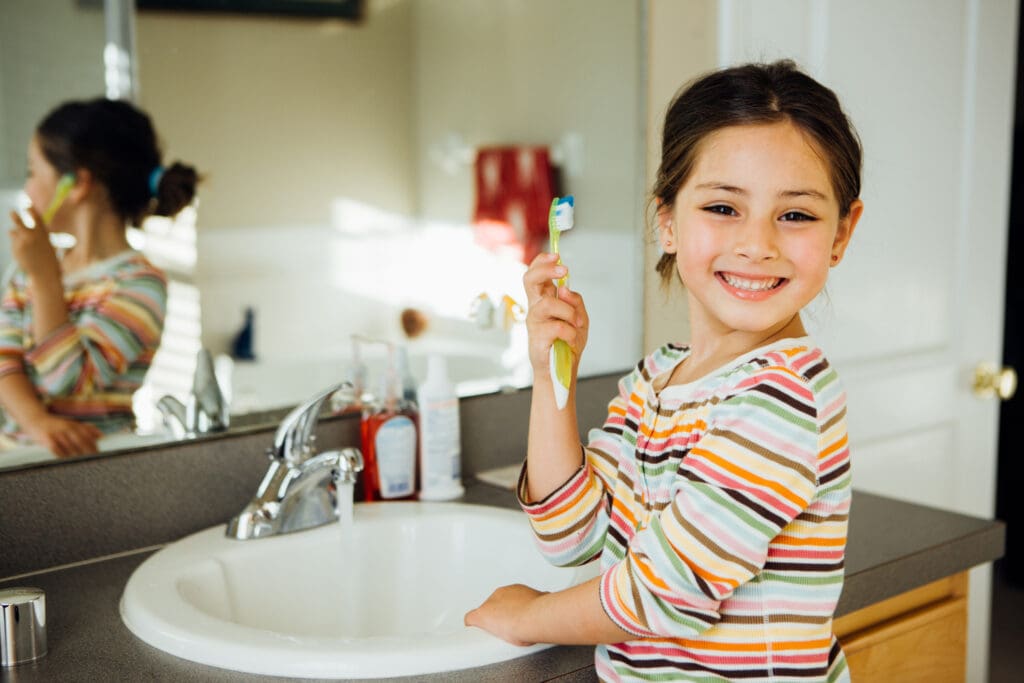Good oral habits are essential for maintaining strong, healthy teeth and gums throughout your child’s life. Starting healthy dental habits early helps ensure your child’s smile stays bright, and their teeth stay strong. By practicing these habits consistently, you can help your child avoid dental problems such as cavities, gum disease, and tooth decay.
The dental care team at Summit Pediatric Dentistry is committed to helping our patients discover the benefits of a healthy smile and feel empowered to care for it as they grow. Dr. Mathew provides a personalized approach to your child’s oral health needs, and our team places an emphasis on educating our patients on good oral hygiene in an age-appropriate manner during their visits.

Why Oral Health is Important for Children
Oral health plays a significant role in your child’s development, overall health, and well-being. Healthy teeth and gums help your child chew food properly, speak clearly, and smile with confidence. Poor oral habits can lead to dental problems such as tooth decay, gum disease, and misalignment of the teeth. Starting good oral hygiene habits at a young age is key to preventing these issues and setting the foundation for a lifetime of healthy teeth.
Essential Oral Habits for Healthy Teeth
- Brush Teeth Twice a Day: Brushing your child’s teeth at least twice a day—once in the morning and once before bed—is one of the most important habits to develop. Use a soft-bristled toothbrush and fluoride toothpaste, and make sure your child brushes for at least two minutes. This helps remove plaque, the sticky film of bacteria that can cause cavities. Please encourage your child to brush their teeth properly by gently brushing in small circles along the front, back, and chewing surfaces of each tooth.
- Floss Daily: Flossing is an important habit that helps clean the spaces between teeth where a toothbrush can’t reach. Starting to floss as soon as your child has two teeth that touch helps prevent plaque buildup and cavities. You can assist your child with flossing until they develop the skill to do it on their own, usually around age 6 or 7.
- Use Mouthwash (When Appropriate): Some children may benefit from using mouthwash after brushing, especially if they’re prone to cavities. Mouthwash can help reduce plaque and bacteria in the mouth and freshen breath. However, make sure the mouthwash is alcohol-free and safe for children. Always supervise younger children when using mouthwash to avoid swallowing it.
- Eat a Balanced Diet: A balanced diet rich in fruits, vegetables, whole grains, and dairy products can support healthy teeth and gums. Foods like apples, carrots, and celery help clean teeth naturally, while dairy products like milk, cheese, and yogurt provide calcium and other nutrients that strengthen teeth. Avoid sugary snacks and drinks, as they can lead to tooth decay. If your child does have sugary treats, make sure they brush their teeth afterward.
- Visit the Dentist Regularly: Regular dental visits are essential for maintaining good oral health. The American Academy of Pediatric Dentistry recommends that your child visit the dentist by their first birthday and continue regular check-ups every six months after that. During these visits, Dr. Mathew will check for any signs of tooth decay, gum disease, or other issues and provide professional cleanings to remove plaque buildup.
Avoiding Common Habits That Can Harm Teeth
Some habits can negatively affect your child’s dental health. It’s important to help your child avoid these behaviors to protect their smile and support healthy oral development.
Thumb sucking is a common habit in young children, but if it continues after the age of 4, it can affect the development of their teeth and jaw. Prolonged thumb sucking can cause problems like misalignment of the teeth (open bite) and changes in the shape of the roof of the mouth. To help your child stop thumb-sucking, gently remind them during the day and offer encouragement. In some cases, our dental care team may suggest using a special thumb-sucking guard or other methods to break the habit.
<p”>Nail biting is another habit that can negatively impact your child’s teeth. It can lead to tooth wear, chipped teeth, and problems with the alignment of the bite. Nail biting may also introduce bacteria into the mouth, increasing the risk of infection. Encourage your child to stop nail biting by providing positive reinforcement and offering stress-relief techniques like squeezing a stress ball.
Some children grind their teeth, especially while sleeping. Teeth grinding can cause wear and tear on the enamel, leading to tooth sensitivity and pain. If you notice that your child is grinding their teeth, talk to your dentist about possible solutions. In some cases, a custom-made nightguard can help protect their teeth from damage.
Constantly sipping sugary drinks like juice or soda can increase the risk of cavities, especially if your child sips throughout the day. The sugar in these drinks feeds bacteria in the mouth, leading to the formation of acids that wear down tooth enamel. Encourage your child to drink water throughout the day, and if they do have sugary drinks, make sure they brush their teeth afterward.
Encouraging Healthy Oral Habits
Encouraging healthy oral habits begins with setting a good example and making dental care fun for your child. One way to make brushing and flossing more enjoyable is to use a timer or play your child’s favorite song while they brush. You can also choose fun toothbrushes featuring their favorite characters to keep them excited about brushing.
A reward system can also motivate your child to maintain good habits—consider rewarding them with a sticker or small treat each time they brush or floss on their own. As your child grows, involve them in the process by letting them pick out their toothpaste, toothbrush, or floss. When they feel more in control and part of the routine, they are more likely to stick with these healthy habits.
Need help with this at home? Ask a member of our dental care team at your child’s next routine dental care visit.
